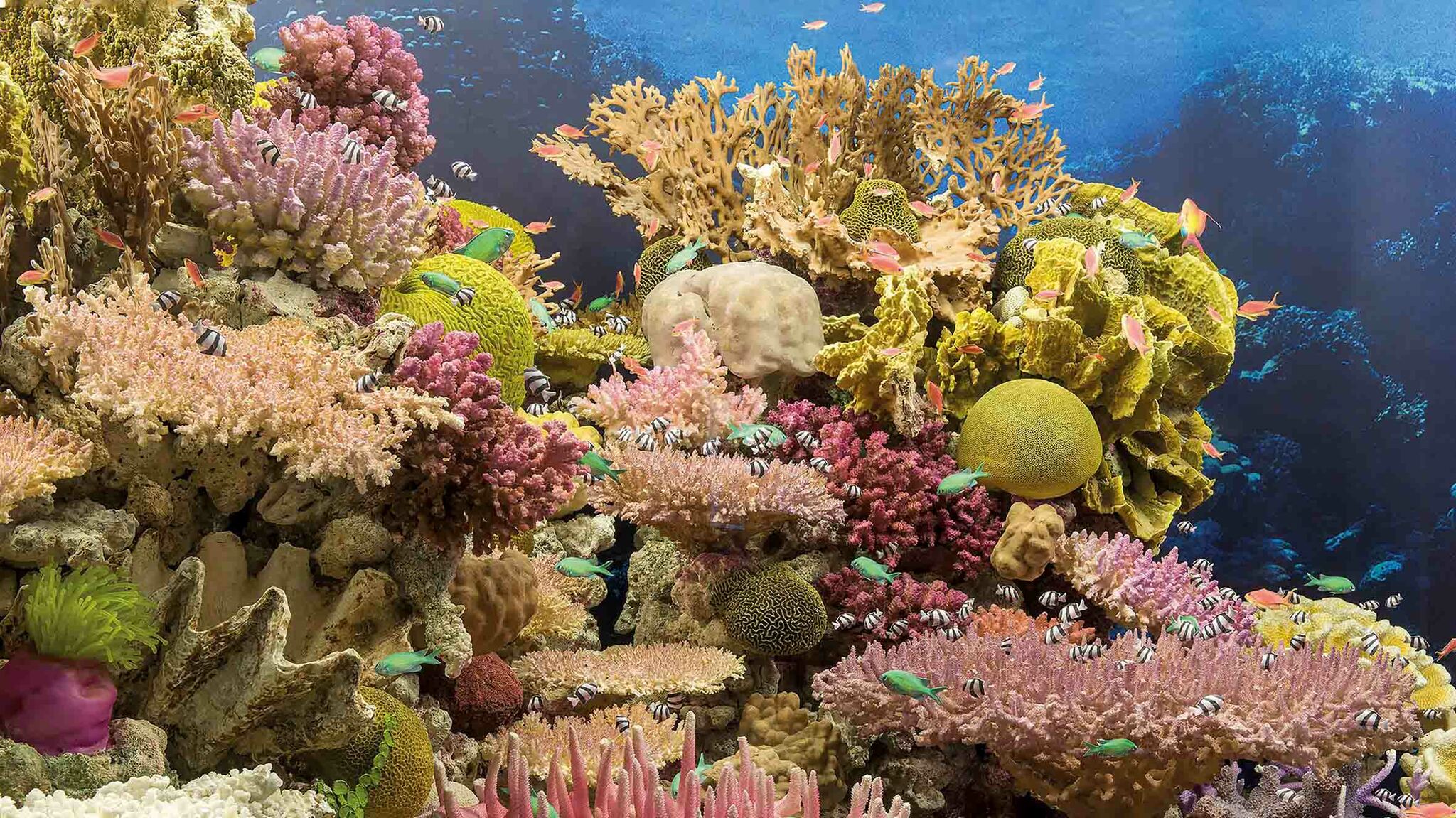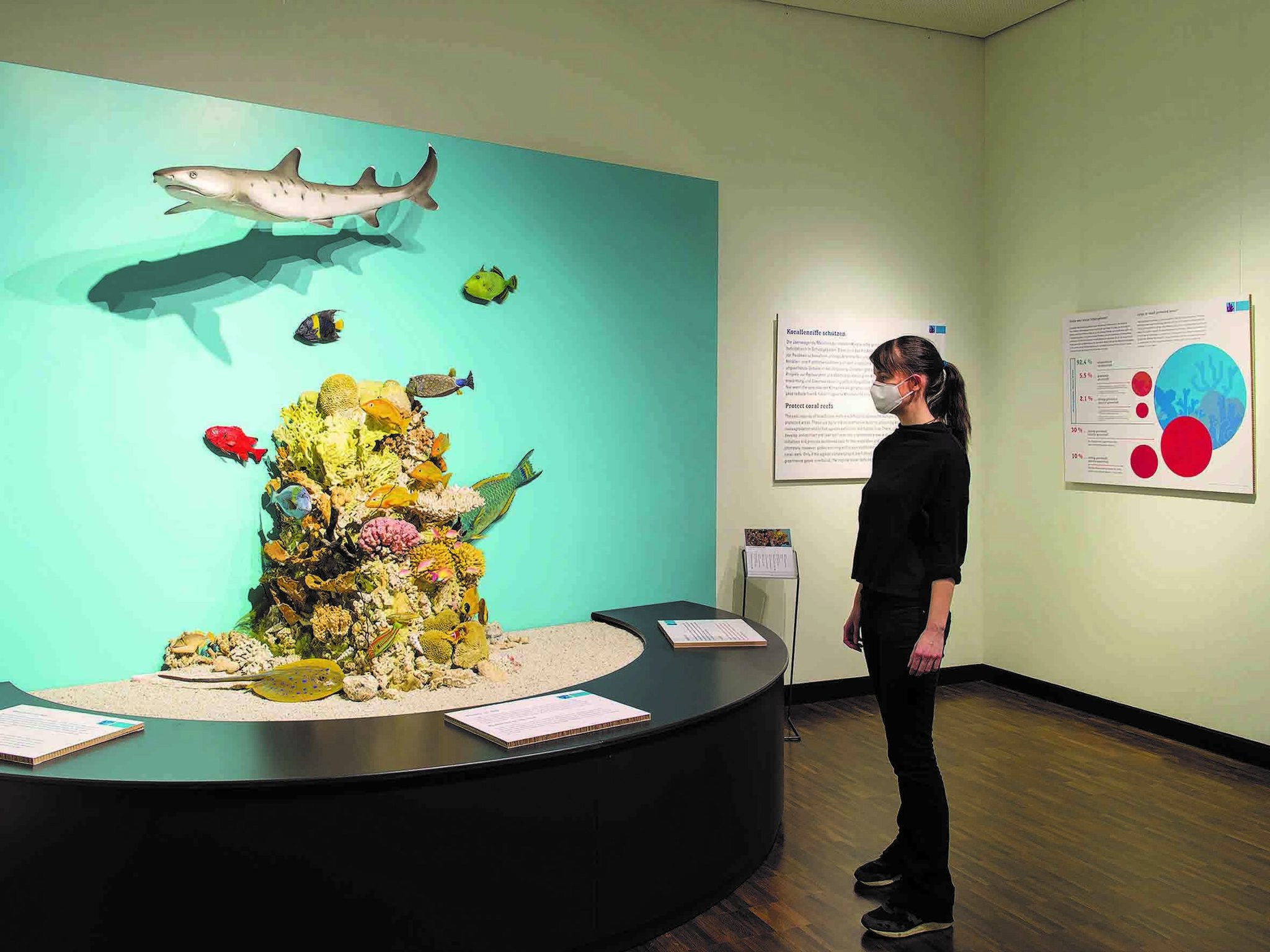
© Volker Beinhorn
14-Month Coral Reef Exhibition in Bremen
“Coral Reefs – varying. vulnerable. vanishing?”: You can find out a great deal about this ecosystem at the Übersee Museum.
To mark both international coral reef symposia “ICRS 2021 VIRTUAL” and “ICRS 2022 IN-PERSON,” which are being organized by the University of Bremen, the Übersee Museum is dedicating an exhibition to this ecosystem. Those interested can dive deep into the fascinating world of coral reefs until July 10, 2022. The exhibition is a cooperation between the ICRS conference team, the Übersee Museum, and the German Oceanographic Museum in Stralsund.
Significance, global and local dangers, protection - visitors are faced with these aspects when going through the exhibition. “Many people are not aware of what coral reefs - including the impressive diversity of organisms that live there - actually do, and not least for us humans,” explains Dr. Michaela Grein from Übersee Museum. However, those who visit the first exhibition part in the main hall of the large Oceania exhibition and the second part in the cabinet of the Übersee Museum, will find out a lot of interesting and surprising things about the oceans’ most significant ecosystem.
It was Professor Christian Wild, President of ICRS 2021 VIRTUAL / ICRS 2022 IN-PERSON and head of the Marine Ecology Department at the University of Bremen who had the idea for the exhibition. The three-person team made up of Dr. Michael Grein from the Übersee Museum in Bremen, Dr. Götz Bodo Reinicke, marine ecology curator at the German Oceanographic Museum in Stralsund, and Heinz Krimmer from the the ICRA 2021/22 organization team then curated the exhibition.
“We in Europe also Contribute to the Worldwide Coral Reef Crisis”
One area of focus of the exhibition is the endangerment of coral reefs. “This aspect is very important as the existence of coral reefs is endangered and we in Europe also contribute to the worldwide coral reef crisis,” states the curator Heinz Krimmer. Professor Christian Wild explains why: “The emission of CO2 and other greenhouse gases leads to warming and acidification in the ocean. Stony corals that form reefs react very sensitively to this. The warming often triggers the feared coral bleaching, whilst the acidification makes the creation of calcium reef structures with corals far more difficult. The high CO2 emission level is therefore a double danger for tropical coral reefs. Thus, it may be the case that we lose these ecosystems in the future.” If you then add local threats, such as over fishing or environmental pollution, loss of coral reefs today already go to devastating extents. “In the Caribbean, around 80 percent of the corals in existence were lost in the past 40 years,” states Dr. Götz Reinicke.

© Volker Beinhorn
There Is Hope, But the Clock Is Ticking
However, it is not too late. There are still intact reefs in all reef regions. Especially in marine regions that are largely free of human influence. Marine biologists are investigating resistant types that can survive higher temperature and are assessing methods for the reforestation of reefs and protected areas are also being created. There is still hope.
But the clock is ticking. Despite all efforts made to date and positive local developments, the destruction of global reefs continues to progress. That is why the exhibition’s message is that there is a desperate need for quick action. Especially the high CO2 emissions need to be reduced as rapidly as is possible as they pose the biggest threat to the future of these ecosystems. It would be an irretrievable loss if the most species-diverse and fascinating ecosystem of the oceans were to be gone forever.
Most Significant Coral Reef Conference Worldwide
For the first time in its 50-year history, the International Coral Reef Symposium (ICRS) will take place in a European country. Originally, it was planned for the international conference to take place last year under the name “14th ICRS 2020.” The symposium had to be postponed due to the pandemic. The ICRS conference organization team from the University of Bremen developed a new concept under the lead of Professor Christian Wild: A solely digital event from July 19 to 23, 2021, with the name “14th ICRS 2021 VIRTUAL” and a live event in Bremen - as originally planned - under the name “15th ICRS 2022 IN-PERSON.” It will be the largest marine conference that has ever taken place in Germany.